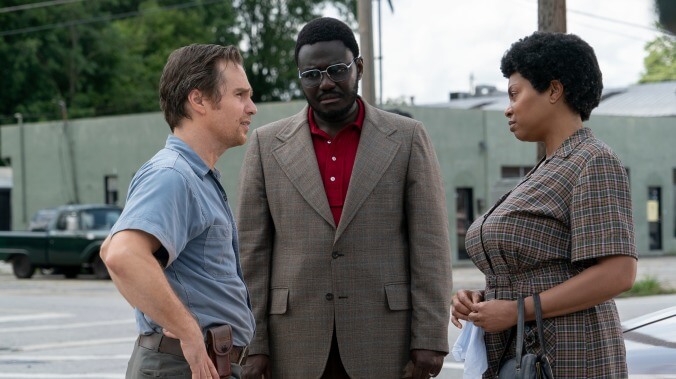Considering cinema’s long history of sympathetically accommodating racist characters (and the role of a particular landmark of American film in mythologizing the Lost Cause and the Klan), a viewer might have good reason to roll their eyes at The Best Of Enemies. Though Atwater and Ellis initially get equal screen time, the real center of the film is the latter’s improbable, heartwarming conversion from dyed-in-the-wool white supremacist to true believer in integration and civil rights. He is (to borrow a euphemism from the last presidential election) the face of “economic anxiety”: a family man, small business owner, and respecter-of-the-troops trying to make ends meet with the help of his long-suffering wife (Anne Heche), who seems less than enthused about her husband’s cross-burning social club. His youngest is falling behind in school and he’s got a son with Down syndrome to take care of, but his filling station is barely paying the bills. (In part, the movie suggests, because he refuses to pump gas for black motorists.)
Ellis’ protracted Road To Damascus moment comes in the form of a charrette—a structured two-week public forum run by an out-of-town academic named Bill Riddick (Babou Ceesay) to settle the question of school integration in Durham. Riddick picks Atwater and Ellis—who are no strangers to each other, having clashed many times at city council meetings—as co-chairs of the charrette “senate.” This committee includes the head of the local White Citizens’ Council (the more respectable, white-cotton-suit answer to the sweat-stained-work-shirt KKK) and a representative of the city’s small, college-educated black elite whom Ellis and Atwater seem to resent in about equal measure, plus an equal number of less political black and white Durhamites selected by lottery. The white members include a nurse, a misanthropic gravedigger, and a Vietnam veteran who runs a local hardware store; the black members, the movie barely even bothers to identify. Like the duplicitous city councilman (Bruce McGill), who wants Ellis to marshal the white vote in favor of the status quo, The Best Of Enemies considers their opinions to be a foregone conclusion not worth addressing.
This imbalance sticks out; the film runs well over two hours, and devotes an inordinate amount of time to a large cast of ancillary white characters, while offering only glimpses of Atwater’s home life to contrast with the attention it lavishes on the domestic and financial struggles of the Ellises and the weekly minutes of the Klan. (We have, for instance, no idea what Atwater does for a living.) The gradual descent into pity-party sucks the energy out of the clash of irascible personalities that animates the earlier parts of the film, with Henson and Rockwell both in top actorly form, imitating assorted back problems as their characters strut and scowl at one another. Working in a mode of middlebrow anonymity, first-time writer-director Robin Bissell does his best to keep the camera out of their way; the most he expresses in terms of creative personality is a couple of confounding sequences set to songs (“Queen Bitch,” “Hurdy Gurdy Man”) that have been used more memorably in far, far better films.
At first, Ellis and Atwater can’t stand the sight of each other, but soon, they find themselves sharing an office, and, later, a lunch table. They learn to make compromises: If Durham’s black citizenry wants to close out each of the exhaustively long session of the charrette with a gospel song, then Ellis’ cohorts should be allowed to set up a display table with Klan literature at the entrance of the junior high where the sessions are being held. It’s a slow process, but eventually, racism is solved.
Of course, it didn’t really happen this way. The charrette itself was organized by the AFL-CIO (unmentioned in the film), and Ellis’ conversion had more to do with his expanding awareness of the way working people (and the racist resentments of poor whites) were being exploited by corporate and political power. “When it comes to money, the green, the other colors make no difference,” he would tell Studs Terkel, the godhead of leftie interviewers and doyen of the American oral history, who considered Ellis one of his favorite interview subjects. Though he had run a filling station, by 1971, he was mostly working as a janitor at Duke University. And the schools in Durham were already beginning to integrate; in fact, Ellis’ and Atwater’s children went to the same high school.
Most movies that are billed as being “based on a true story” play fast and loose with events and motivations—especially, it seems, when racism is involved. But Bissell’s fudging of the facts (which includes completely making up the reasons behind the charrette) doesn’t create a story that’s more insightful or dramatically cohesive than the real thing; the only thing it reveals, if indirectly, is liberalism’s longstanding discomfort with the relationship between civil rights and labor movements. But in this era when smaller distributors are struggling to figure out how to put butts in the multiplex, the makers of The Best Of Enemies might have been wise to take inspiration from William Castle, the mid-2oth-century schlock king who attached electrical buzzers to theater seats for a movie called The Tingler: Sell premium tickets and rig up a contraption that will pat viewers on the back at all the right moments.













![HBO teases new Euphoria, Larry David, and much more in 2026 sizzle reel [Updated]](https://img.pastemagazine.com/wp-content/avuploads/2025/12/12100344/MixCollage-12-Dec-2025-09-56-AM-9137.jpg)




























